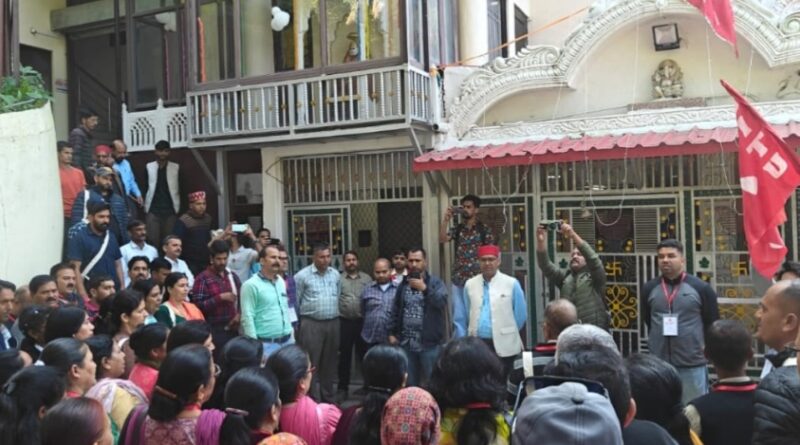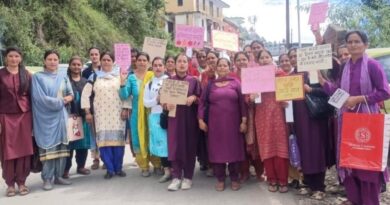Two day district conference of CITU began at Shimla.
The two-day district conference of the CITU District Committee Shimla began at the Aggarwal Dharmashala in Shimla. Representatives from fraternal organizations including the Himachal Kisan Sabha, SFI, and Janvadi Mahila Samiti, such as Dr. Rajendra Chauhan, Sonia Sabarbal, Rama Rawat, Anil Thakur, Sunny Sikta, Ritesh Kumar, Mukesh Kumar, Vivek Nehra, Pawan Kumar, Vivek Birsanta, and Pavindra, among others, were present at the conference. The flag hoisting was done by District President Kuldeep Dogra. The conference report was presented by District General Secretary Ajay Dulta. The condolence resolution was moved by District Treasurer Balak Ram.
began at the Aggarwal Dharmashala in Shimla. Around two hundred representatives from approximately fifty unions of the district are participating in the conference. The conference was inaugurated by CITU National Secretary Dr. Kashmir Thakur. CITU State President Vijendra Mehra, Vice President Jagat Ram, and Conference Reception Committee Chairman Jagmohan Thakur were specially present at the conference.
Inaugurating the conference, Dr. Kashmir Thakur said that CITU in Himachal Pradesh has been continuously fighting for demands such as: against the Modi government’s imposition of slavery and bonded labour on workers through the four anti-worker Labour Codes; for a minimum wage of ₹26,000; for the regularization of scheme workers, outsourced, contract, multi-task, temporary, casual, and trainee workers; for an increase in the MGNREGA budget; for implementing minimum wages for MGNREGA workers; and for ensuring the economic benefits of the Labour Welfare Board.
He said that the implementation of the four Labour Codes by the Modi government will exclude seventy percent of industries and seventy-four percent of workers from the purview of labour laws. Workers face strict punishments and fines for going on strike. The contract system and fixed-term employment will be promoted instead of permanent employment. Increasing working hours from eight to twelve will establish bonded labour. He said the struggle continues on issues such as: declaring Anganwadi, Mid-Day Meal, and ASHA workers as government employees and implementing gratuity for them; declaring a minimum wage of ₹26,000 for workers; against the four anti-worker Labour Codes, the National Monetisation Pipeline, 100% Foreign Direct Investment in the insurance sector; against increasing workers’ working hours from eight to twelve; ensuring job security for contract workers and giving them wages equal to regular workers; restoring the Old Pension Scheme for employees of boards and corporations of the central and state governments; implementing a minimum pension of ₹9,000; restoring the economic benefits and registration facility for MGNREGA and construction workers from the Labour Welfare Board; declaring Scheduled Employment for STP workers; formulating policies for outsourced and hospital staff; giving industrial workers a 40% wage hike; against the demolition of fixed shops/vendors (‘theka bajri’); providing 200 days of work per year at a wage of ₹600 per day in MGNREGA along with its expansion to urban areas; registering MGNREGA, construction, and BRO workers with the Labour Welfare Board and restoring their economic benefits; formulating policies for outsourced, 108 and 102 ambulance staff; curbing high inflation; and stopping the privatization of public sector enterprises.
He said that due to the neo-liberal and pro-capitalist policies of the Modi government at the center, unemployment, poverty, inequality, and the crisis of livelihood are increasing. Poverty and hunger are rising due to unemployment and inflation. He stated that CITU has been continuously agitating for a minimum wage of ₹26,000 per month and ensuring pension for all workers; for the repeal of the four anti-worker Labour Codes and the Electricity Amendment Bill; for banning the contract, part-time, multi-purpose, multi-task, temporary, casual, fixed-term, contractor system, and outsourcing system and regularizing all these workers; for providing 200 days of work per year at a wage of ₹600 per day in MGNREGA along with its expansion to urban areas; and for the demands of MGNREGA, construction, and BRO workers. On issues such as the Old Pension Scheme for Anganwadi, Mid-Day Meal, ASHA workers, State Electricity Board employees, municipal corporation employees, and employees of other boards and corporations; the privatization and regularization of BRO; the Street Vendors Act; anti-worker and anti-owner amendments in the Motor Vehicles Act, etc., struggle is the only way against the anti-worker policies of the Modi government.



